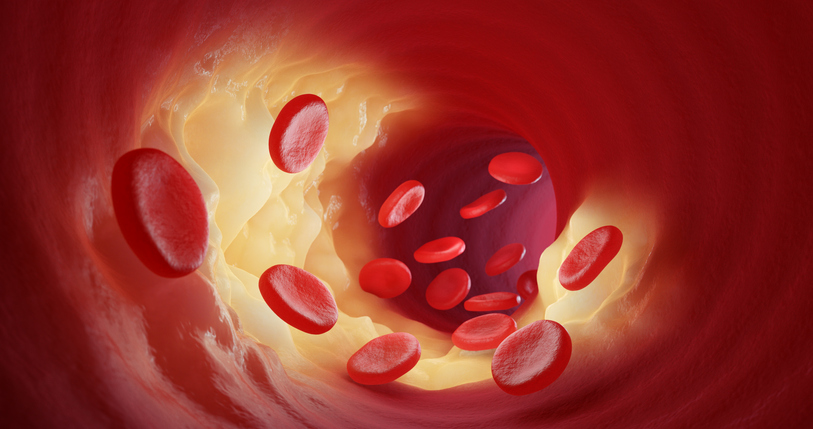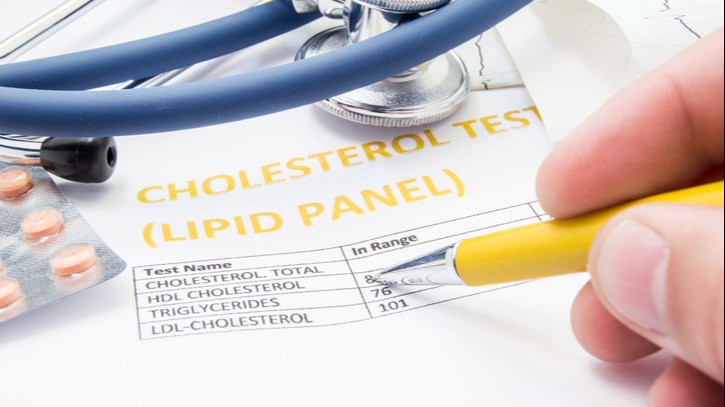
You may have heard about high cholesterol. You may even have heard that high cholesterol is a risk factor for heart disease. This means that some (but not all) people with high cholesterol have a greater chance of suffering a heart attack. High cholesterol also increases the risk of strokes and peripheral vascular disease (i.e., clogged blood vessels, usually in the legs).
As a physician, I have treated many individuals with high cholesterol. I know from experience that the condition is often preventable unless you have familial hypercholesterolemia, meaning that you inherited high cholesterol from your parents. I also know that there are lifestyle changes and medications that can reduce the risks of living with high cholesterol.
Understanding High Cholesterol
Cholesterol is essential for building cells and making hormones. It can be thought of as a waxy, fat-like substance that circulates in the bloodstream. There are two primary types: the good and the less-than-good. High-density lipoprotein (HDL) cholesterol is the so-called 'good cholesterol.' HDL helps clear out the arteries. In contrast, low-density lipoprotein (LDL) cholesterol can cause problems in excessive amounts. LDL cholesterol sticks to the walls of blood vessels, creating blockages that can lead to heart problems.
You may not know if you have high cholesterol because it does not create symptoms. When I counsel patients with high cholesterol, I tell them that their genes play a role, but so do lifestyle choices. Overeating saturated and trans fats, living a sedentary life instead of moving, smoking, and carrying extra weight can all raise cholesterol levels. Keeping an eye on what you eat, staying active, and stopping smoking can help maintain cholesterol at safe levels. Regular check-ups with your care provider are also essential.
Effects of High Cholesterol on Health
Untreated high cholesterol is like a silent killer, gradually laying the groundwork for severe health complications. It significantly increases the risk of heart disease, essential in developing narrowed and hardened arteries (atherosclerosis). When these blood vessels become clogged, they restrict blood flow to the heart, increasing the likelihood of chest pain, heart attacks, or even heart failure. This intrusion into the heart's functionality can severely impact daily life, leading to fatigue, shortness of breath, and a reduced ability to engage in physical activities, affecting everything from taking a stroll to carrying out routine tasks.
The consequences of untreated high cholesterol extend beyond the heart; it increases the odds of a stroke. When blood flow to the brain is disrupted due to blockages caused by cholesterol buildup, it can result in a stroke—a sudden interruption of blood supply leading to brain damage. Strokes often bring about life-altering consequences, ranging from difficulties in movement and speech to cognitive impairments. These events can radically reshape daily life, demanding extensive rehabilitation and assistance with daily activities, potentially impacting one's independence and overall quality of life.

Diagnosis and Monitoring
Diagnosing high cholesterol is relatively straightforward. It usually begins with a simple blood test known as a lipid profile. This test measures various types of cholesterol in the blood, including LDL, HDL, and triglycerides, a different kind of fat. Typically, this test is performed after fasting to ensure accurate results. Based on the lipid profile, healthcare providers can evaluate cholesterol levels and assess the risk of cardiovascular issues. If the results indicate high cholesterol, additional tests or screenings might be recommended to delve deeper into potential underlying causes or associated health risks.
Monitoring cholesterol levels is a cornerstone of preventive care. The testing frequency often depends on various factors, including age, existing health conditions, family history, and lifestyle habits. Getting a lipid profile once every few years is standard practice for many adults. However, individuals with known risk factors or those already diagnosed with high cholesterol may require more frequent monitoring, sometimes annually or semi-annually. Consistent monitoring is critical as it helps track changes in cholesterol levels, assess the effectiveness of lifestyle modifications or medications, and enables early intervention if levels start creeping up, preventing potential health complications over time.
Lifestyle Changes for Managing High Cholesterol
A good diet is crucial in managing high cholesterol, and simple yet effective modifications can make a notable difference. Reducing saturated and trans fats in processed foods, fatty meats, and fried dishes is significant. Instead, healthier fats like avocados, nuts, seeds, and olive oil can positively impact cholesterol levels. Incorporating more high-fiber foods such as fruits, vegetables, whole grains, and legumes can also help lower LDL cholesterol. Soluble fiber, particularly abundant in oats, barley, and fruits like apples and citrus, works like a sponge in the digestive system, soaking up cholesterol and carrying it out of the body. Additionally, including sources of omega-3 fatty acids like fatty fish (salmon, mackerel, sardines) or flaxseeds can contribute to boosting HDL cholesterol levels and promoting heart health. Making these dietary adjustments, alongside maintaining a balanced and varied eating pattern, can be a powerful strategy for managing high cholesterol levels.
Physical activity can significantly impact cholesterol levels by increasing HDL and lowering LDL. Exercise prompts the body to use excess cholesterol for energy, preventing it from building up in the blood vessels. Moreover, exercise is essential for weight management, which also helps control cholesterol. Shedding extra pounds through regular physical activity helps improve cholesterol profiles, reducing LDL cholesterol and triglycerides while boosting HDL cholesterol. Combined with a healthy diet, exercise promotes weight loss and overall cardiovascular health.

Medication and Treatment Options
When lifestyle changes alone are not enough to manage high cholesterol, medications can step in as a valuable addition to the arsenal against it. One such medication is Ezetimibe, often prescribed with statins or as a standalone therapy. Ezetimibe works differently from statins; it helps lower cholesterol by inhibiting cholesterol absorption in the intestines. Ezetimibe can reduce LDL cholesterol levels by blocking the absorption of dietary cholesterol and cholesterol produced by the body. This medication benefits individuals who cannot tolerate high doses of statins or as an additional treatment when statins alone are insufficient to reach target cholesterol levels. It is essential to discuss medications with healthcare providers to determine the most suitable treatment approach, whether incorporating Ezetimibe or other medications, based on individual cholesterol management needs and health considerations.
If you have any questions or concerns about high cholesterol, schedule an appointment with your healthcare provider, who will ask questions, perform a physical examination, order blood tests, and recommend a plan to help improve your quality of life.
Rely on PlanetDrugsDirect.com to Buy Your Cholesterol Prescription Discount Drugs Online
As a trusted prescription referral service, we offer important benefits whenever you order online. Each of our partner pharmacies and/or government-approved dispensaries is committed to providing the best experience possible of any online prescription referral service on the internet. We offer:
Low prices
Quick turn-around times
Generic and brand-name medications
Unparalleled customer service
Sources
Rosuvastatin/Ezetimibe: A Review in Hypercholesterolemia - PubMed (nih.gov)
 Medically reviewed by
Medically reviewed by 




